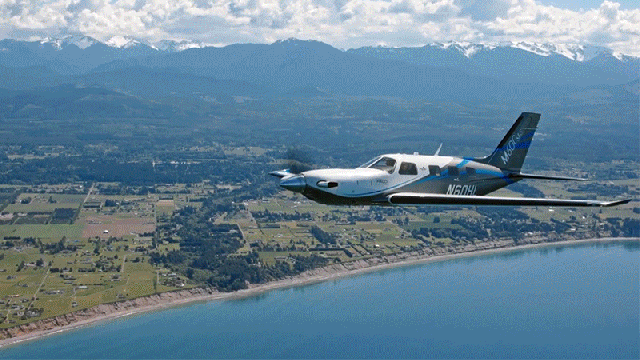Those worried about the safety of autonomous vehicles might be surprised to hear that most commercial aircraft can already fly and even land themselves. To date, it’s a feature that’s only been available on larger aircraft, but Garmin is now bringing it to smaller private planes with its new Autoland system. Thing is, unlike Garmin’s other products, it’s probably not for you.
Garmin is a name more synonymous these days with fitness trackers, smartwatches, and the GPS navsat suction cupped to the windshield of your parents’ car. But the company has also been making professional-grade marine and aviation GPS systems for 30 years, and now, instead of just showing pilots where they’re headed, the company says its Autoland system can take over all the controls and autonomously land an aircraft without any human intervention.
The Autoland feature can be manually activated by pressing a button on the aircraft’s instrument layout, and while Garmin promises “Autoland can also activate automatically if the system determines it’s necessary,” the company hasn’t explicitly detailed what criteria it uses to make that call, but it could be as simple as monitoring the controls for a lack of input or response from the pilot.
Once activated (it can also be manually deactivated at any time, according to Garmin) the Autoland system assesses the plane’s situation including its location, fuel levels, nearby terrain and obstacles, and the weather, and then intelligently determines which of the closest airports would be ideal and able to accommodate the aircraft for an emergency landing. Other factors like the length of available runways at the airport are taken into consideration, but Garmin also specifies that “[t]he availability of a GPS approach with lateral and vertical guidance to the runway is also required when the system is considering various airports and runways.” So even if a small single airstrip is the closest place to land, it might not actually be a viable option as the Garmin Autoland system requires the same infrastructure found at larger airports that commercial autopilot systems also rely on.
After locating a suitable airport that’s safely in range of the plane’s remaining fuel levels, taking into account detours around mountains or storms, the Autoland system takes control of the plane’s controls, automatically communicates with local air traffic controllers and pilots flying in the vicinity so they’re all aware of the aircraft, its emergency situation, its location, and where it’s headed, the company says.
This information is also displayed on the plane’s various flight displays so everyone in the aircraft knows what’s going on, and in the event it’s only the pilot that’s been incapacitated, passengers are also able to talk to local air traffic control using easy to follow on-screen buttons, instead of having to figure out how the aircraft’s radio system works.
If all goes well, the plane will touch down all by itself, automatically apply the brakes, and then shut down the engines before alerting everyone on board that it’s safe to exit the craft, at which point emergency personnel standing by can take over.
Garmin hasn’t specified pricing details for the Autoland system, but that’s probably because it can’t be installed on just any aircraft. It needs to be able to fully integrate and interface with a plane’s fly-by-wire control systems, so at launch, it will initially only be available as an option (pending certification) on the Cirrus Vision Jet and the Piper M600, which sell for $3 million and $4 million, respectively.
In other words, it’s a safety option for private aircraft companies or those who can afford a lifestyle that includes private plane travel. If you’re just a flying enthusiast with a small single-prop Cessna, you’ll want to stick with a parachute for emergencies.
